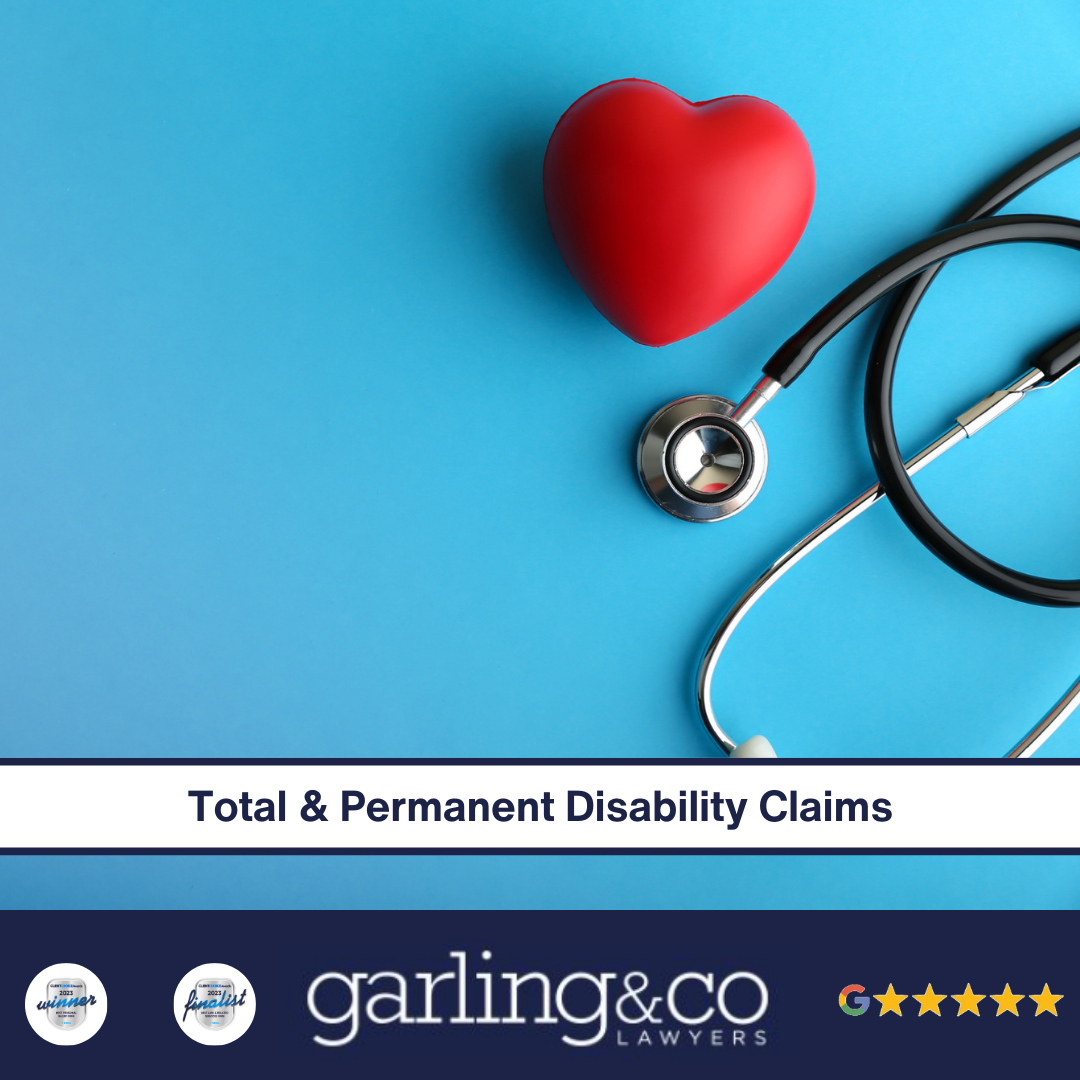
Not everyone automatically receives TPD cover when they start with a superfund. Your entitlements depend on your Superannuation policy.
How do I find out if I have TPD Insurance?
Look at your super fund account statement or call your super fund and ask: “Am I covered for TPD?”. If you are looking at your superfund online, it will usually have a TPD section that says “Insurance cover” under that heading will usually have three types of cover: Death, TPD, and Income Protection. If there is a figure next to TPD it means you have a TPD policy. If there is $0.00 or it says “not covered” it is more than likely that you have no TPD insurance, but always call your super fund to confirm.
I have a Policy, so can I make a Claim?
To be able to make a claim for TPD you will need to have active cover at the time of injury. This means if you join your superfund in August 2018 and have TPD insurance, but your injury occurred on May 2018 you will not be covered for TPD.
Some TPD funds also require you or your employer to be making the required contributions into your superannuation account. If you or your employer has not made the required contributions, you may be prevented from claiming the TPD benefit under your superannuation fund.
Some funds also require a minimum premium before your TPD benefit will be activated.
How do I make my Claim for TPD?
Once you have determined that you have an injury that prevents you from returning for work, and you have active TPD insurance at the time of injury you can make a claim.
To make a claim you should follow these steps:
- Call your Superfund/TPD Insurer and notify them that you wish to make a claim for TPD benefits under your policy
- Request the claim forms and the policy documents that were in place at the time of injury
- Once you receive your claim form and policy documents contact a lawyer to help you fill them out
TPD claim forms are very important. If you fill out your claim for incorrectly or do not obtain sufficient medical evidence to support your claim your claim may be declined. For this reason, we advise that you consult an Accredited Specialist In Personal Injury Law for assistance with your TPD claim.
Why do I need to Request the Policy Documents?
Your right to your TPD benefit depends entirely on the terms and conditions set out in the policy document that was in force at the time of your injury.
The policy document sets out relevant information about:
- Waiting periods: How long you have to wait after your injury before you benefit becomes payable. This is usually between 6-12 month
- Approval process:How the insurer assesses your claim and what you can expect to happen. For example, the policy document will set out requirement for medical assessments, review procedures, and time frames for assessing your claim. The insurer usually takes between 6-12 months to decide on a claim for TPD benefits
- TPD definitions: This is the most important part of the policy documents. It will tell you the criteria that you will need to satisfy to classify as “TPD” and to be eligible to claim your TPD benefit
Why are TPD Definitions so Important?
TPD definitions vary from policy to policy. It is important that your lawyer reviews the definition of total permanent disablement under your policy as this will determine whether you are eligible to claim the TPD Benefit.
Most policies contain definitions that require the insured member to be unfit for employment for a number of months and unlikely to ever be able to return to gainful employment.
See the below examples of TPD definitions:
Example 1
- Absent from employment for six consecutive months because of sickness or injury; and
- Is so disabled at the start of those six months and continuously since that time that the Insured member is unlikely to ever engage in any reasonably suitable occupation
Put simply, this definition means that you must not be able to work for the first six months following your injury and it does not appear that you will ever return to suitable employment in the future.
Example 2
- The insured member is unable to perform, in respect of the first two years of disability, at least one income producing duty of their regular occupation
- The important duties of any gainful occupation for which you are reasonably suited by way of education, training, or experience
- Are not working in any undertaking usually performed for wage of profit
- Are under the regular care, and following the advice and treatment of a Medical Practitioner
This example is far more complex, unfortunately definitions under TPD policies are beginning to become more complex and have more elements that need to be satisfied to try and minimise the amount of TPD benefits paid out.
Example two requires the policy holder to be unfit for at lease one aspect of their usual job in the first two years, and following that, in order to be eligible the condition must deteriorate to the extent that the policy holder can no longer perform “important duties” of their gainful employment.
The second example also brings in training/education component. Which means that if you can be retrained in any other type of employment and you would be able to undertake that employment you will not be TPD.
In effect to satisfy this definition you must not be able to work and never be able to work in any form of employment ever again.
What does that mean?
Often there are a number of vague terms in the definitions such as “important duties” or “one income producing duty” which are difficult to understand.
Where these terms aren’t defined it is up to interpretation which can make claiming a TPD benefit very difficult.
For this reason, it is advised to contact a lawyer who knows and understands TPD claims and the insurer framework.
How do I fill out my TPD Forms?
The TPD insurer will send you out forms to complete. You will need to complete the following:
- Application for TPD: You will need to include information about your injury or illness, details of your incapacity to work, your medical history, employment history, and financial history.
- Doctors Statement x 2: Your treatment general practitioner who you have seen for your injury/illness will need to complete a form detailing the nature and extent of your injury/illness. They will also need to provide their opinion as to whether you will ever work again. The other Doctors Statement will need to be completed by another doctor, you can use either a specialist, another general practitioner, or any other doctor you have consulted for you injury/illness
- Certified proof of identity: You will need to provide certified copies of your driver licence, passport, or birth certificate.
- Medical evidence: Your claim for TPD must be accompanied by medical evidence supporting your claim that you are totally and permanently disabled.
What Medical Evidence do I need to Provide?
The medical evidence that you will need to provide depends entirely on your injury or illness.
For example, if you are unable to work due to a workplace injury and you have made a workers’ compensation claim for whole person impairment, you can provide the medical evidence to the TPD insurer as it will prove that you have a whole person impairment and will address your ongoing incapacity and your inability to work.
If you have a longstanding illness you will need to provide evidence detailing the treatment received. It will also be beneficial to obtain a detailed report addressing your restrictions and provide detailed reasons as to why you can no longer undertake aspects of your gainful employment.
Will I be Medically Assessed?
The insurer will have you assessed if they think you may not satisfy the TPD definition.
In our experience, if the right medical evidence is provided with your application it will be difficult for the insurer to dispute your work capacity and they may approve your claim without the need for a medical assessment.
If the insurer decides to have you assessed they will likely have you assessed for the purposes of obtaining an employability assessment report or they will have you assessed by an occupational physician to see if you are able to undertake your employment as per the definition of TPD.
Will my Claim be Accepted?
In our experience, most claims are accepted first go if the right evidence is submitted with the claim form and TPD benefits are paid out within 12 -18 months of receipt of the application.
The remaining claims are either rejected by the insurer of the Superfund or delayed longer that 12-18 months as the insurer does not have enough medical evidence or because there has been another claim such as a workers’ compensation or motor vehicle accident claim that relates to the injury.
What do I do if my Claim is Rejected?
You can either request a reassessment of the declined claim or if you think the decision reached by the TPD insurer is incorrect and not made in good faith or formed unreasonably you can challenge the insurers decision in Court.
You should contact a Lawyer to assist with your claim as the insurer can be very difficult to deal with and often decline claim in the hope people do not challenge the decision.












